
views
Implementing any change in the legacy customs and traditions of the Army will be preceded by an elaborate consultative process, which will also involve Army commanders as well as veterans, top defence officials familiar with the development said on Wednesday.
“They will be discussed internally among officials and views of Army veterans will be taken as well. Changes, if any, will be carried out only after reaching a consensus,” a top official told News18.
The official added that the Army will not change its regimentation system or ethos synonymous with its units as part of the ongoing drive to do away with some of the colonial-era practices still prevalent in the force.
“We do not intend to dilute the Army’s regimentation in any manner,” the official said, adding that any change in regimental names is unlikely.
Military officers describe the regimentation system in the multicultural Army as one that cohesively ties regiments with specific troop composition with the same fighting ethos.
The top official’s statement comes at a time when the Army’s latest efforts to junk colonial-era customs and traditions have drawn the ire of serving officers and veterans who voiced strong opinions against what they said was an attempt to needlessly tinker with its well-preserved customs, traditions, and regimental ethos.
News18 was the first to report that the Army is in the process of reviewing a series of colonial-era practices to see if they can be discarded. These included pre-Independence battle honours, officers’ mess procedures, and gun carriages brought in for military funerals.
‘Changes in Colonel of Regiment system unlikely’
The official said that “Indianisation” of the Armed Forces was initiated soon after Independence.
“There are a few legacy issues which are reviewed from time to time. We have been doing this over the years. Many of our erstwhile rules, regulations, accoutrements, and uniform had undergone changes in the past as part of the process,” a second official said. “For instance, the Army uniforms had undergone several changes in the past—from khaki to Olive Green—and even the combat dresses, Earlier, it was communicated in English to officers in their messes that their food was ready, but now it is done in Hindi or in the language spoken by the troops in that regiment.”
The discussions last week were merely internal discussions to assess and review certain practices related to various traditions, uniform, and renaming of institutions of the Armed Forces such as Pune-based Queen Mary’s Technical Institute for Differently Abled Soldiers to gain feedback on them, the first official quoted said.
The official also said that the system of having a Colonel of the Regiment is unlikely to change, for the senior officer is responsible for taking care of every issue concerning his regiment.
Asked about proposed changes to the Beating Retreat ceremony, the official said no decision on any changes in an event like the ceremony can be taken without extensive consultations within the government.
Services’ efforts towards dropping colonial practices
All three defence services have been actively working on further Indianisation of the Armed Forces. Earlier this month, the Navy unveiled a new naval ensign which removed the St George’s Cross, and introduced a blue octagonal shape encompassing the national emblem sitting atop an anchor.
As reported by News18, the ensign also dropped the fouled anchor—another colonial-era vestige—thus paving the way for a new naval crest as well.
Earlier this year, the traditional hymn Abide With Me was dropped for the first time since 1950 in the Beating Retreat ceremony on January 29 and was replaced by the Hindi patriotic song Ae Mere Watan Ke Logon. In the last two years, there has been a greater emphasis on playing Indian tunes at the ceremony by the military bands.
In March last year, Prime Minister Narendra Modi had spoken about enhancing indigenisation in military equipment as well as in doctrines, procedures, and customs followed by the Armed Forces, at the Combined Commanders Conference in Gujarat’s Kevadia.
The military training curriculum has also been expanded in the last few years to include indigenous texts such as Kautilya’s Arthashastra in strategic studies with more focus on Indian war heroes, leaders, and thinkers, alongside writings of Chinese strategist Sun Tzu and German General Clausewitz.
“Much of the Indian indigenous texts are also taught in other militaries,” the first official said.
Read all the Latest News India and Breaking News here




















Comments
0 comment